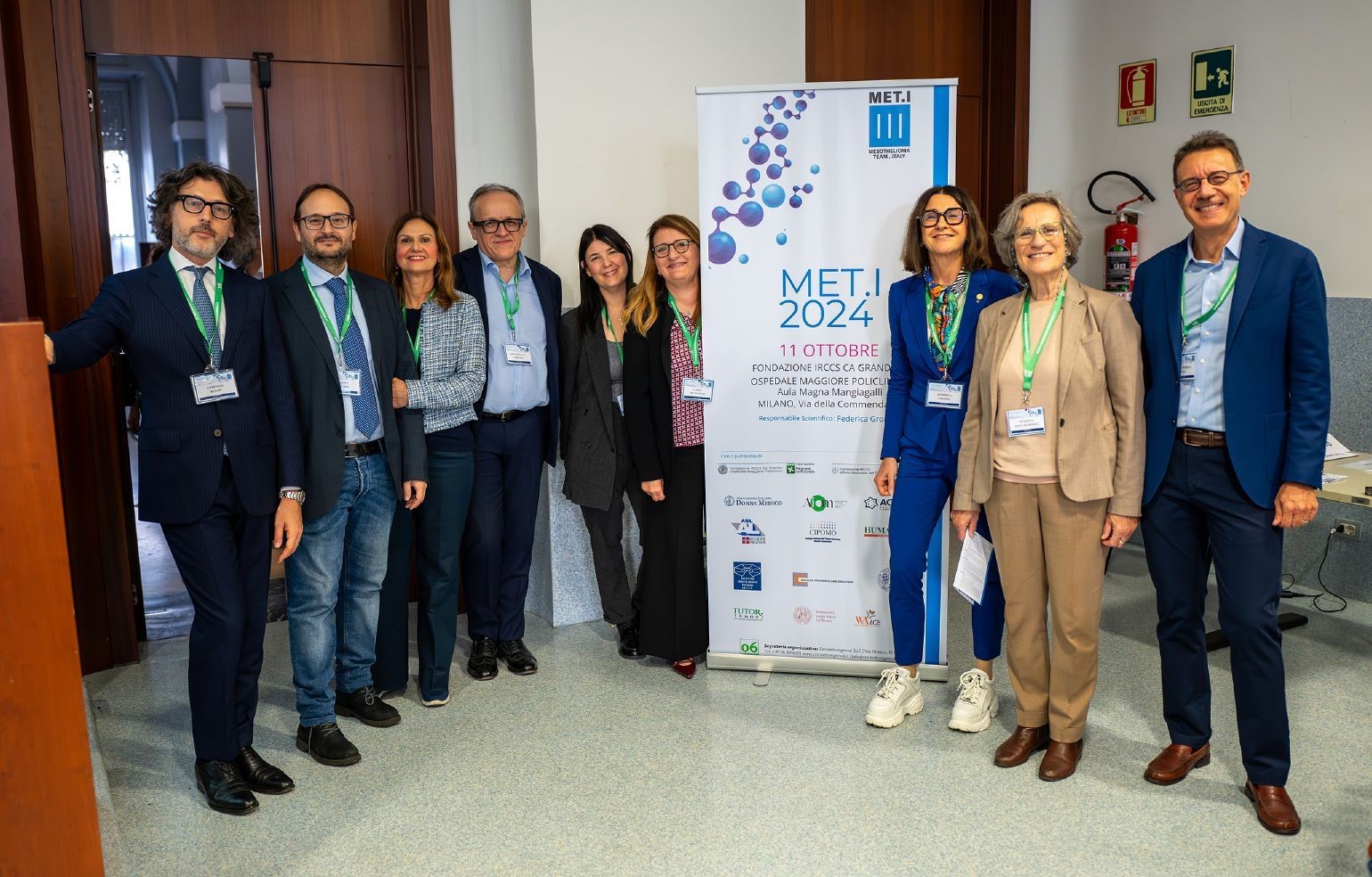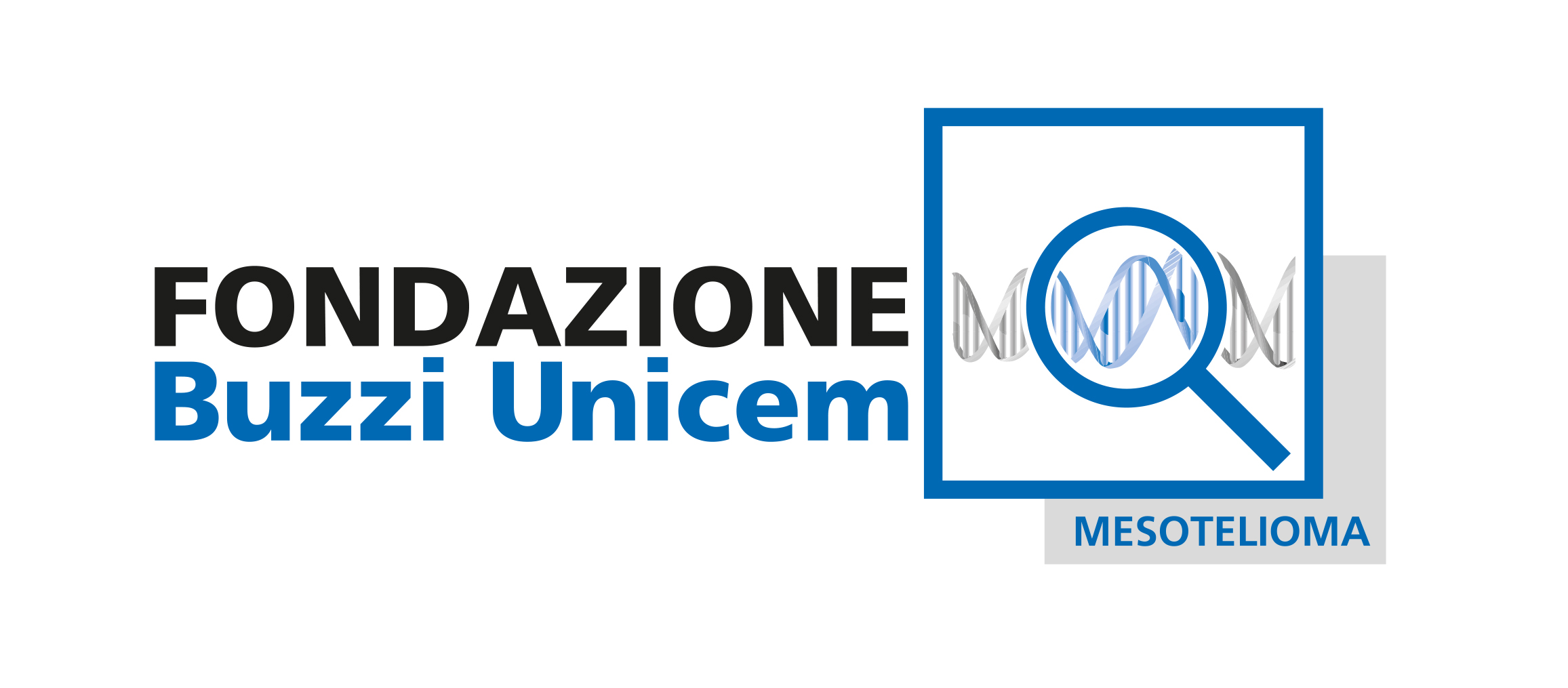Il congresso inaugurale di MET.I unisce esperti italiani nella lotta contro il mesotelioma
Si è svolto il primo partecipatissimo congresso MET.I, acronimo per Mesothelioma Team Italy, venerdì 11 ottobre, nell’aula magna Mangiagalli della Fondazione IRCCS Ca’ Granda Ospedale Maggiore Policlinico di Milano. Scaturita dalla collaborazione tra un gruppo di oncologi italiani (con profonda esperienza nella cura di pazienti con mesotelioma), l’associazione Tu.To.R. (che si fa carico dei malati affetti da tumori toracici rari) e la Fondazione Buzzi Unicem (impegnata da anni a sostenere la ricerca), «la Fondazione MET.I – spiega Federica Grosso, che è tra i cofondatori del team e responsabile scientifico del congresso milanese – ha lo scopo di incentivare la ricerca, identificare appropriati percorsi diagnostico-terapeutici e creare un importante dataset su scala nazionale per approfondire la conoscenza della malattia».
Un progetto ambizioso?
Sì, ma non impossibile, affermano i promotori che «sentono» il peso sociale di questa patologia e la pressante attesa di terapie risolutive.
Il mesotelioma pleurico è un cancro correlato all’esposizione professionale o ambientale all’amianto e che, in Italia, colpisce ancora circa 1800 persone all’anno, benché l’amianto sia stato bandito dal territorio nazionale nel 1992: una patologia particolarmente complessa da gestire non soltanto per il comportamento aggressivo e eterogeneo che la caratterizza e per la scarsità di innovazioni terapeutiche, ma anche per il corredo sintomatologico e per le rilevanti ricadute sociali e psicologiche che coinvolgono sia i pazienti sia i loro famigliari. Sebbene l’introduzione della immunoterapia abbia rappresentato un passo avanti nella terapia del mesotelioma pleurico, questo non è ancora sufficiente; servono studi clinici e traslazionali che consentano di trovare cure più efficaci, così come sta avvenendo per altri tumori più frequenti.
Che cosa si propone MET.I?
Un progetto d’azione è stato concordato e messo a punto dai medici fondatori - Giovanni Luca Ceresoli (Humanitas Gavazzeni Bergamo), Federica Grosso (Azienda Ospedaliera Universitaria di Alessandria), Giuseppe Lo Russo (Istituto Nazionale Tumori di Milano), Giulia Pasello (Istituto Oncologico Veneto/Università di Padova) e Paolo Andrea Zucali (Humanitas Milano) - e condiviso da oltre 40 centri italiani.
La matrice indispensabile è l’informazione puntuale associata a una formazione diffusa su tutto il territorio nazionale, in modo da accrescere la conoscenza della biologia di questo tumore, consentire diagnosi più accurate e tempestive e accedere a cure innovative in modo più omogeneo in tutti i centri di cura.
«MET.I promuoverà un approccio “olistico”, cioè globale, alla malattia attraverso l’integrazione della ricerca con la cura, ma anche con adeguati supporti al paziente dal punto di vista nutrizionale e psicologico e con l’acquisizione di una chiara consapevolezza sia da parte dei pazienti che dei famigliari e caregiver» spiega Laura Abate-Daga, presidente dell’associazione Tu.To.R. che, con Susanna Leto di Priolo, referente Tu.To.R., sono stati facilitatori e promotori al progetto. «Siamo particolarmente soddisfatti della grande adesione ricevuta all’iniziativa e della volontà di costituire un network dove mettere a massa comune le esperienze di ciascun centro a favore delle persone colpite dal mesotelioma».
MET.I, inoltre, può contare sul prezioso supporto organizzativo e finanziario della Fondazione Buzzi Unicem ETS, «la cui mission – ha ricordato la presidente Consolata Buzzi – è, dal 2003, quella di promuovere e sostenere interventi rivolti al miglioramento della diagnosi e della cura».
Il convegno è stato aperto dal saluto beneaugurale di Lorenzo Rosso (Fondazione Irccs Ca’ Granda Ospedale Maggiore Policlinico di Milano), che ha ricordato il ruolo storico della Medicina del lavoro nel mesotelioma svolto dal Policlinico di Milano, fin dal 1974.
Via via, attraverso gli interventi specifici dei relatori e le tavole rotonde che si sono susseguite nella giornata, si è delineato il quadro complessivo che serve da presa di coscienza condivisa dello stato dell’arte: sono stati presentati i dati emersi dagli studi epidemiologici italiani, è stato illustrato l’importante ruolo del Registro Nazionale Mesoteliomi, articolato in Centri Operativi Regionali, evidenziando che la segnalazione dei casi non solo rappresenta un obbligo di legge, ma è anche cruciale per il riconoscimento di malattia professionale o del contributo una tantum destinato a tutti i pazienti con questa diagnosi. Si è parlato, poi, di diagnostica patologica e, in particolare, dell’importanza della rete di patologi per consentire diagnosi accurate e tempestive.
La lettura magistrale in memoria di Giulio Rossi, patologo italiano conosciuto in tutto il mondo per l’attività di ricerca sul mesotelioma e scomparso prematuramente, è stata affidata alla professoressa Francoise Galateau-Salle, patologa francese che, nella sua carriera, ha contribuito profondamente a incrementare la conoscenza della malattia ed è fondatrice della rete dei patologi francesi sul mesotelioma.
Particolare attenzione è stata dedicata al trattamento della patologia e alla presentazione degli studi clinici attualmente attivi in Italia.
Il pomeriggio ha avuto un taglio più operativo, dedicato ai veri protagonisti di questi network: i pazienti e le associazioni.
Al saluto della Presidente Consolata Buzzi è seguito un intervento più operativo sull’impegno della Fondazione Buzzi Unicem ETS a sostegno di MET.I. da parte del consigliere Fausto Chilò, che ha illustrato le attività ad oggi effettuate e quelle pianificate per il futuro al fine di permettere a MET.I di perseguire le proprie finalità scientifiche con la forma giuridica più efficiente e piena copertura finanziaria.
Il professor Renato Balduzzi ha quindi evidenziato quale dovrà essere il ruolo delle istituzioni in questo contesto ricordando il suo operato in qualità di Ministro della Salute del governo Monti e sottolineando come il mondo del mesotelioma abbia insegnato l’importanza della connessione ambiente-salute, caposaldo della one-health.
Si è affrontato il tema dell’impatto psicologico causato dalla patologia e sono stati illustrati i modelli dei gruppi psicanalitici brevi e dei questionari di valutazione del distress psicologico che la diagnosi provoca nei malati e in chi li assiste, messi a punto grazie agli studi dell’Università di Torino in collaborazione con Inail.
Una tavola rotonda, guidata da Ivano Caponigro di Tu.To.R., ha coinvolto le associazioni di volontari impegnate sul fronte del mesotelioma: Afeva (Associazione Famigliari e Vittime Amianto) di Casale ed Emilia-Romagna, Vitas, Walce, Gruppo Aiuto Mesotelioma, Lotta al Mesotelioma, Fondazione Bepi Ferro, Anmil, e si è evidenziato sia che cosa possono fare questi gruppi per MET.I sia quel che si aspettano da MET.I
Al termine, i responsabili dei 4 working group già attivi in MET.I hanno presentato l’attività svolta e, in particolare, si sono soffermati sulla definizione delle variabili di un data base per la raccolta dei casi su scala nazionale collegato al Registro Nazionale Mesotelioma, sugli studi clinici in fase di attivazione, sulla attività di fundraising pianificata e sulla attività del «gruppo qualità di processi» che sta analizzando le varie tappe del percorso diagnostico per definire standard minimi di qualità per ogni procedura.
Il congresso si è chiuso con una tavola rotonda che ha messo a confronto numerosi clinici e ricercatori, particolarmente coinvolti, a livello nazionale, nella cura e nello studio del mesotelioma pleurico: a loro il compito di delineare gli obiettivi di un futuro auspicabilmente prossimo.
La giornata di presentazione e di studio, dedicata al ricordo dei colleghi Giulio Rossi e Manlio Mencoboni (oncologo di Genova), tra i primi sostenitori del progetto prematuramente ed improvvisamente scomparsi, ha gettato le basi di un lavoro comune per dare una risposta concreta a chi si ammala di mesotelioma.
Chi è in prima linea da anni in questa battaglia ha acquisito, nel tempo, una consapevolezza precisa: ciò che è indispensabile uno scambio diretto e immediato tra i ricercatori di ogni parte del mondo e una connessione stretta tra i clinici (oncologi, ma anche medici di molte altre fondamentali discipline).

